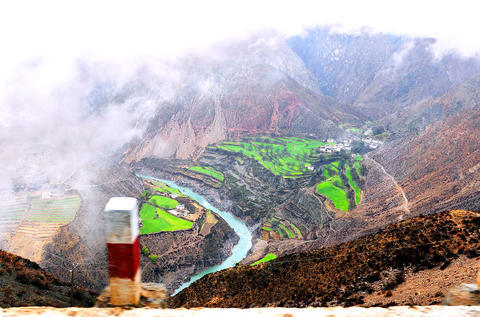The newly refurbished Route 3 that cuts through this remote town is an ordinary strip of pavement, the type of two-lane road you might find winding through the backwoods of Vermont or sunflower fields in the French provinces.
But On Leusa, 70, who lives near the road, calls it "deluxe."
As a young woman she traded opium and tiger bones along the road, then nothing more than a horse trail.

PHOTO: AFP
Yesterday, the prime ministers of Cambodia, China, Laos, Myanmar, Thailand and Vietnam inaugurated the former opium smuggling route as the final link of what they call the "north-south economic corridor," a 1,150km network of roads linking the southern Chinese city of Kunming to Bangkok.
The network, several sections of which were still unpaved as late as December, is a major milestone for China and its southern neighbors. The low-lying mountains here, the foothills of the Himalayas, served for centuries as a natural defensive boundary between Southeast Asian civilizations and the giant empire to the north. The road rarely follows a straight line as it meanders through terraced rice fields and tea plantations.
Today, those same Southeast Asian civilizations alternately crave closer integration with that empire and fear its sway as an emerging economic giant. China, in turn, covets the land, markets and natural resources of one of Asia's least developed and most pristine regions.
With trade across these borders increasing by double digits every year, China has helped construct a series of roads inside the territory of its southern neighbors. The Chinese government is paying half the cost of a bridge over the Mekong River between Laos and Thailand, due for completion in 2011.
It financed parts of Route 3 in Laos and refurbished roads in northern Myanmar, including the storied Burma Road used by the Allies in World War II to supply troops fighting the Japanese. China is also building an oil and gas pipeline from the Bay of Bengal through Myanmar to Kunming.
Taken together, these roads are breaking the isolation of the thinly inhabited upper reaches of Laos, Myanmar and Vietnam, areas that in recent decades languished because of wars, ethnic rivalries and heroin trafficking. The roads run through the heart of the Golden Triangle, the region that once produced 70 percent of the world's opium crop.
The new roads, as well as upgraded ports along the Mekong River, are changing the diets and spending habits of people on both sides of the border. China is selling fruit and green vegetables that favor temperate climates to its southern neighbors, and is buying tropical fruit, rubber, sugar cane, palm oil and seafood.
"You never used to see apples in the traditional markets," said Ruth Banomyong, an expert in logistics who teaches at Thammasat University in Bangkok.
Overall, even before the completion of the road, trade between China and the upland Southeast Asian countries Cambodia, Laos, Myanmar, Thailand and Vietnam had risen impressively, to US$53 billion last year from slightly more than US$1 billion a decade ago.

VAGUE: The criteria of the amnesty remain unclear, but it would cover political violence from 1999 to today, and those convicted of murder or drug trafficking would not qualify Venezuelan Acting President Delcy Rodriguez on Friday announced an amnesty bill that could lead to the release of hundreds of prisoners, including opposition leaders, journalists and human rights activists detained for political reasons. The measure had long been sought by the US-backed opposition. It is the latest concession Rodriguez has made since taking the reins of the country on Jan. 3 after the brazen seizure of then-Venezuelan president Nicolas Maduro. Rodriguez told a gathering of justices, magistrates, ministers, military brass and other government leaders that the ruling party-controlled Venezuelan National Assembly would take up the bill with urgency. Rodriguez also announced the shutdown

Civil society leaders and members of a left-wing coalition yesterday filed impeachment complaints against Philippine Vice President Sara Duterte, restarting a process sidelined by the Supreme Court last year. Both cases accuse Duterte of misusing public funds during her term as education secretary, while one revives allegations that she threatened to assassinate former ally Philippine President Ferdinand Marcos Jr. The filings come on the same day that a committee in the House of Representatives was to begin hearings into impeachment complaints against Marcos, accused of corruption tied to a spiraling scandal over bogus flood control projects. Under the constitution, an impeachment by the

Exiled Tibetans began a unique global election yesterday for a government representing a homeland many have never seen, as part of a democratic exercise voters say carries great weight. From red-robed Buddhist monks in the snowy Himalayas, to political exiles in megacities across South Asia, to refugees in Australia, Europe and North America, voting takes place in 27 countries — but not China. “Elections ... show that the struggle for Tibet’s freedom and independence continues from generation to generation,” said candidate Gyaltsen Chokye, 33, who is based in the Indian hill-town of Dharamsala, headquarters of the government-in-exile, the Central Tibetan Administration (CTA). It

China executed 11 people linked to Myanmar criminal gangs, including “key members” of telecom scam operations, state media reported yesterday, as Beijing toughens its response to the sprawling, transnational industry. Fraud compounds where scammers lure Internet users into fake romantic relationships and cryptocurrency investments have flourished across Southeast Asia, including in Myanmar. Initially largely targeting Chinese speakers, the criminal groups behind the compounds have expanded operations into multiple languages to steal from victims around the world. Those conducting the scams are sometimes willing con artists, and other times trafficked foreign nationals forced to work. In the past few years, Beijing has stepped up cooperation